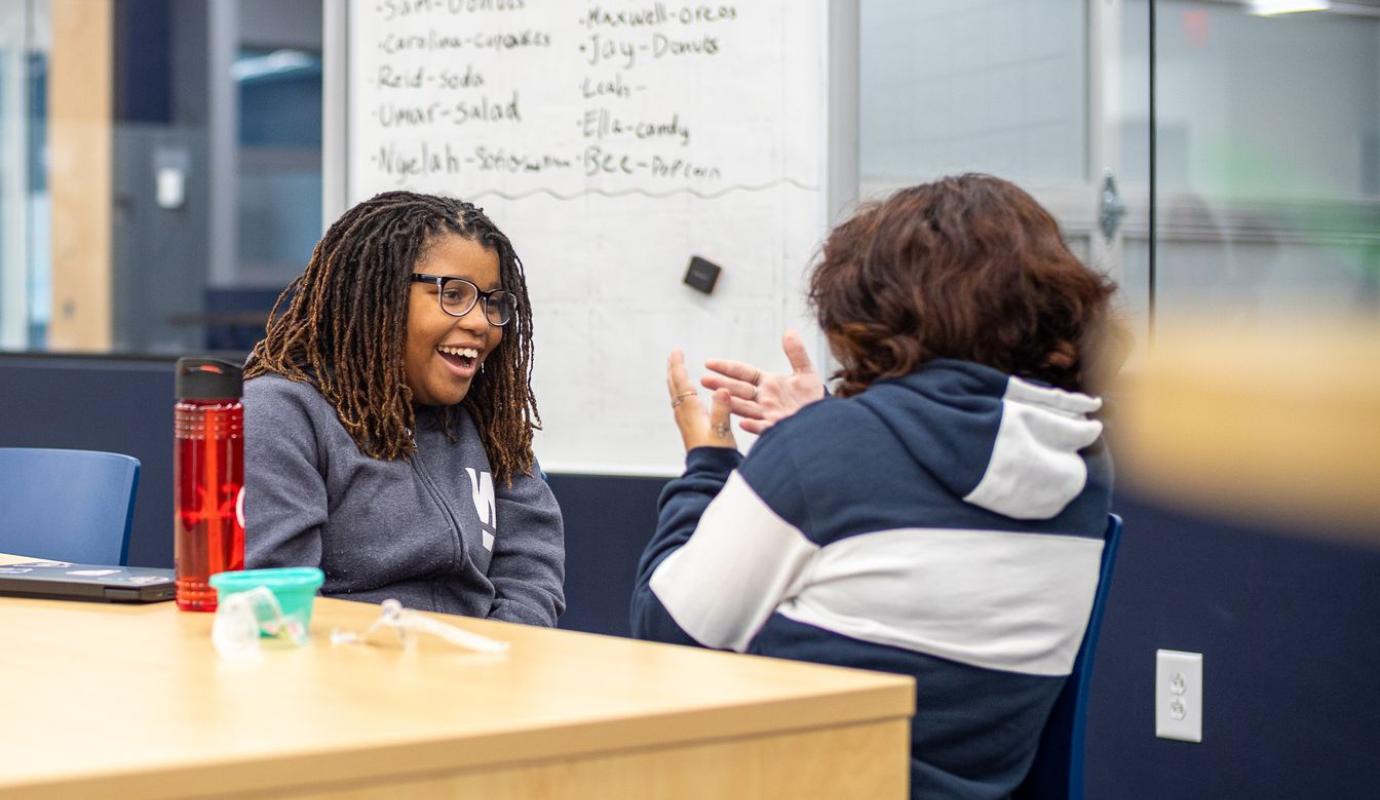By Louis Frank, head of middle school
I ended my first visit to Wellington by meeting with the entire middle school staffulty. I had spent the past eight hours witnessing and experiencing a day in the life of the division: morning meeting, classroom observations, lunch with students, and conversations with various community members (plus the beginning of Volcano Week). As I sat in front of the group who made it all possible, I shared with them a culminating sentiment that I’d been turning over in my mind all afternoon: “I wish I could bring all of you back home with me.” Of course, it proved much easier for me to come to Wellington. I fear that my earnest excitement about the school has become something of a meme at the adult level (look no further than Dr. Terwin’s Halloween costume and its accompanying “imitation” of me).
Over the past six months, I've had the opportunity to experience the joy and impact of Wellington’s middle school education – justification for my excitement! Along the way, I rediscovered an article that helped me articulate and clarify a philosophy of middle school education: Nancy L. Deutsch’s “‘You just have to get through it’: Letting go of enduring stereotypes about middle school.” Deutsch is a professor of education at the University of Virginia, and she serves as the leader of the Remaking Middle School initiative, dedicated to “elevating the innovation that is present in middle schools across the country and...working to build and steward a new collective effort for young adolescent learning and development.” Deutsch argues, “Middle school can both reflect the developmental changes that youth experience—and reinforce their strengths; autonomy, connectedness, active learning, innovation, and activism to name a few.”
Revisiting Deutsch’s words and Remaking Middle School’s vision affirmed Wellington’s approach and helped explain my perpetual enthusiasm. At Wellington, we reject the traditional formulation of middle school in the cultural imagination: that “you just have to get through it,” and that it’s simply an experience that students must endure and compartmentalize. Deutsch’s epigraph, “Young adolescents are capable of so much more than people think,” serves as the tonal center of our work. We live and celebrate this ethos each day, and the learning environment is iteratively co-created with the evolving needs of our students at the center. Wellington’s middle school is designed to work for students: to meet them where they are, to honor, respect, and respond to their unique lived experiences, and to create the conditions for a supportive academic environment in which they can feel safe to push themselves into their challenge zone – where the most authentic learning happens.
Deutsch outlines five practices of a middle school that work for students: project-based, student-centered learning that offers opportunities for autonomy and identity; iterative approaches that allow students to take risks and learn from mistakes; engaging students in thinking about their own learning and promoting a growth mindset; dedicated time and structure for fostering both student-teacher and peer relationships; and scaffolded opportunities for conversation and inquiry around authentic and relevant issues.
What does this look like at Wellington? It takes several forms across the school environment, inside and outside of the classroom. In English class, students begin the year with explorations of the self: “Where I’m From” poems in 6th grade; “This I Believe” essays in 7th grade; and rambling autobiography in 8th grade. Each of these assignments presents opportunities for authentic expression, creativity, and positive identity formation. The 8th grade world language program’s International Week asks students to present research projects to an audience of their peers, which elevates student voice and builds community. Explorers of the World challenges 5th graders to embark upon student-centered research projects that spark passion and curiosity. Each student selects a research topic that creates interdisciplinary connections across the curriculum. Sixth graders in science class select a contemporary issue that matters to them, and they spend weeks researching the causes and generating solutions – all of which they present to their peers. February promises the return of Volcano Week, a soaring celebration of student-centered, project-based learning that requires a risk-taking and growth mindset while building community across divisions.
Because of the school's structure, Wellington students and teachers engage in metacognitive processes. Feedback from the Willing Learner Metric on how students show up in each class creates opportunities for students to think about their own learning and reflect upon their growth. The Wellington Initiative’s student engagement data offers the same processes for the adults in the building. I relish the opportunity to observe formal critiques in 7th and 8th grade art classes, where work is presented for peer review; students describe, decode, and interpret each other’s work, embracing various interpretations and practicing listening, collaboration, and critical thinking. The culminating artist statements allow students to articulate and reflect upon their process and learning.
Wellington understands and respects the connection between relationships and academic outcomes. Research tells us that adolescents “seek out trusted adults to guide them as they navigate new relationships, shape their identities, and tackle new challenges. Teens also may feel more empowered to exercise their autonomy if they have the support of adults” (Kansky, Ruzek, & Allen, 2017). Our schedule is intentionally designed with this in mind: students have three daily checkpoints with advisors, and our program places an emphasis on building and sustaining healthy relationships. This is supported by a robust student success infrastructure and an approach to navigating conflict that is grounded in restoration, care, and growth.
We strive to support students to cultivate independence, self-awareness, and curiosity, and Wellington’s middle schoolers learn how to advocate for themselves and locate joy throughout the learning process. Equipped with the foundational skills to succeed in upper school, our students are compassionate community citizens who can communicate effectively with confidence and listen thoughtfully with grace and patience. All it takes is one day to see it in action and become enraptured. I’m proud to be a Jag!
